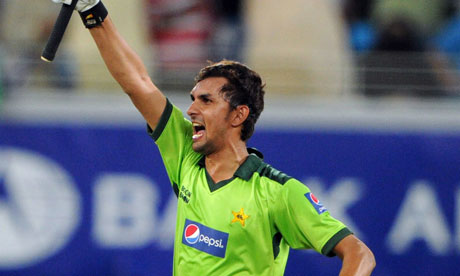
The curse of the whistleblower is to be denounced as a fraud, a fantasist or a weirdo. In America, where they have an organisation for everything, the National Whistleblowers Center in Washington helps people wanting to expose iniquity, much like our own Public Concern at Work. Either may hear soon from a 24-year-old Pakistani wicketkeeper.
Let's imagine this as a short movie, a study in motivation. Zulqarnain Haider approaches passport control at Heathrow one day and asks for sanctuary. Behind him he has left a wife and two daughters in Pakistan and the national team in Dubai, who learn of his disappearance when they find his hotel room empty.
The immediate cause of Haider's flight is a conversation he says he had near the team hotel. An unknown man approaches him to say: "If you work with us, we will give you a lot of money. If not, we will not select you again in cricket and, if you go back home, we will kill you and your family."Notice the "we" in "we will not select you again in cricket". One largely ignored facet of this drama is that if Haider's interlocutor existed he boasted of his power to pick the Pakistan XI. All three layers are present: potential reward, intermediary punishment, and death, not just for him but his family. If Haider is for real, the offer he was made and the warning he was given imply a connection between match- and spot-fixing, team selection and serious organised crime.
In other words they suggest corruption runs through many tiers of Pakistan cricket. In a recent editorial, the country's Daily Times speculated: "The elephant in the room is the link between people wielding power and the bookmakers. It is alleged that a top bookmaker and mafia don have connections with a powerful intelligence agency in Pakistan."
This is as far as conjecture can be pushed in the strange tale of Haider's dash to Britain, which featured a chaotic press conference in the backroom of a curry house in Southall. To summarise, he claims he was approached before the fourth one-day international against South Africa, in which he hit 19 winning runs, and then fled before the fifth, the second target for the alleged match-fixers.
Here in England he has said players' phones should be tapped to assist evidence gathering and that "a lot of people" are involved in the scam. He has said, too, that he does not want any aid from the British government beyond temporary asylum and has promised to co-operate with the International Cricket Council's Anti‑Corruption and Security Unit.
To gain a sense of Haider's motivation it is tempting to imagine him on that flight to London, knowing what was ahead of him and what lay behind: most poignantly, grave danger for his wife and daughters. No conclusion can be drawn from such a filmic and intuitive form of analysis, but most of us would think something fairly big must have spooked him in Dubai to cause him to run away from his family and his livelihood.
We would suspect also that a professional cricketer had to break in the end, and that Haider simply looks like the first to buckle. Heroic status eludes him, so far. No senior Pakistan cricketer, either serving or retired, has praised his actions. Some asked why he waited at least four days after the threat to his life to board a flight to London.
Denunciations fly in from those who say he ought to have "reported his concerns" to the Pakistan team management and the ICC's detectives, which protocol required him to do.
And from Pakistan's sports minister, Ijaz Hussain Jakhrani, came the most brutal condemnation: "If he is such a weak and scared person he should not have played cricket in the first place, particularly not for the national team." Asif Iqbal weighed in: "He has let the motherland down. There wasn't even a reserve wicketkeeper to replace him. He just flew off."
This censorious tone obscures the dark realities of the past year. The current cycle of trouble began with the dubious tour of Australia, with its suspicious Sydney Test and nine straight defeats for Pakistan in all formats. After the News of the World's spot-fixing exposé, Mohammad Amir, Mohammad Asif and Salman Butt are under an ICC provisional suspension and have had their central contracts cancelled by the Pakistan Cricket Board.
As pressure builds in India, the hub of cricket betting, to legalise and therefore regulate the wild east of gambling on the country's national sport, you wonder why more punters are not put off by all the evidence suggesting choreography on the field of play. It's an odd kink of human nature that people will go on betting in an apparently bent casino, as if to beat a crooked system confers more pleasure than winning against an honest house.
At the centre of this vast global issue is one man who stepped off a flight in London and told the BBC on Friday: "I want to be a good citizen."









